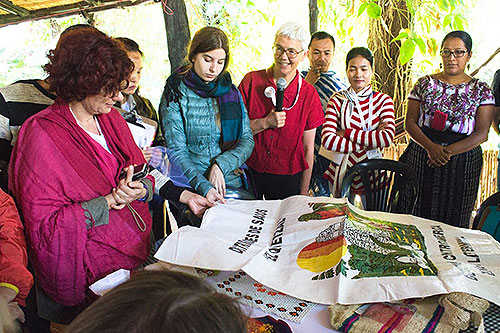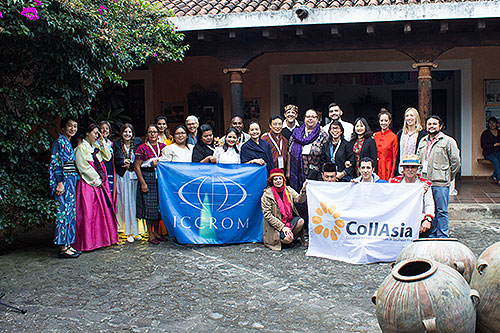CollAsia International Course on Conservation of Textiles and Costumes in Southeast Asia, 24 Oct – 11 Nov 2016, begins in Antigua, Guatemala
 The CollAsia International Course on Conservation of Textiles and Costumes in Southeast Asia has gathered over 25 colleagues from leading heritage institutions all over the world to meet in La Antigua, Guatemala. The course has brought together professionals from distant geographical points, as far apart as the Himalayan Kingdom of Bhutan and Argentina, Vietnam and Egypt, Indonesia and Greece, the Philippines and Korea, Japan and the United Kingdom, Brazil and Cambodia.
The CollAsia International Course on Conservation of Textiles and Costumes in Southeast Asia has gathered over 25 colleagues from leading heritage institutions all over the world to meet in La Antigua, Guatemala. The course has brought together professionals from distant geographical points, as far apart as the Himalayan Kingdom of Bhutan and Argentina, Vietnam and Egypt, Indonesia and Greece, the Philippines and Korea, Japan and the United Kingdom, Brazil and Cambodia.
The course aim is to explore together with colleagues from Guatemala the commonalities and differences in the heritage we care for, and to increase awareness of the diversity of cultural and professional perspectives.
The CollAsia programme was established to improve the conditions for the conservation of heritage collections in Southeast Asia. Since its inception in 2002, the CollAsia programme has recognized the importance of building professional connections worldwide, while also focusing on the challenges of the heritage sector in this region.
 After a series of fourteen successful workshops in Southeast Asia, the CollAsia programme has launched a new dimension. In the past, it had brought together people from around the world to Asia, but now it is taking the training activity itself to a region new to the CollAsia professional community, the Central American country of Guatemala. In doing so, the programme recognises the crucial role that sharing different perspectives plays in strengthening our understanding of local material culture and our professional identities. It also energizes the discussion around the different roles and responsibilities in the conservation field.
After a series of fourteen successful workshops in Southeast Asia, the CollAsia programme has launched a new dimension. In the past, it had brought together people from around the world to Asia, but now it is taking the training activity itself to a region new to the CollAsia professional community, the Central American country of Guatemala. In doing so, the programme recognises the crucial role that sharing different perspectives plays in strengthening our understanding of local material culture and our professional identities. It also energizes the discussion around the different roles and responsibilities in the conservation field.
The vibrant living heritage tradition of Guatemala, an ICCROM Member State since 1973, weaves together ancient techniques and today’s practices, and offers a rich setting for addressing the course theme of textile and costume conservation. The Casa Museo K’ojom is an educational research centre and museum dedicated to the traditions of Mayan communities in Guatemala. Its unique collections of objects and sound recordings incorporate a fantastic variety of textiles and costumes, and provide the perfect setting for identifying shared material know-how and techniques, and for comparing and discussing conservation strategies.
 This ground-breaking course was officially inaugurated on Tuesday 25 October by CollAsia and ICCROM project manager Ms Katriina Similä and by Mr Samuel Fernando Franco Arce, Director of the Casa Museo K’ojom. At the opening ceremony, Katriina Similä highlighted that the “international heritage community is made up of professionals, and the more we create opportunities for direct links between these professionals, the stronger the global networks will become, leading to new and innovative approaches.” Samuel Franco stressed for his part the great privilege of Casa K’ojom to welcome Southeast Asian colleagues to Guatemala and to Latin America.
This ground-breaking course was officially inaugurated on Tuesday 25 October by CollAsia and ICCROM project manager Ms Katriina Similä and by Mr Samuel Fernando Franco Arce, Director of the Casa Museo K’ojom. At the opening ceremony, Katriina Similä highlighted that the “international heritage community is made up of professionals, and the more we create opportunities for direct links between these professionals, the stronger the global networks will become, leading to new and innovative approaches.” Samuel Franco stressed for his part the great privilege of Casa K’ojom to welcome Southeast Asian colleagues to Guatemala and to Latin America.
The course has been made possible thanks to the collaboration of ICCROM with Casa K’ojom, and the support of the CHA-Korean Heritage Agency, the Ministry of Culture of Guatemala, the Fundación Valle del Panchoy and the Museo Ixchel del Traje Indigena in Guatemala City.
Member States represented: Argentina, Brazil, Cambodia, Egypt, Finland, Greece, Guatemala, India, Italy, Malaysia, Philippines, Republic of Korea, Thailand, United Kingdom, Viet Nam
